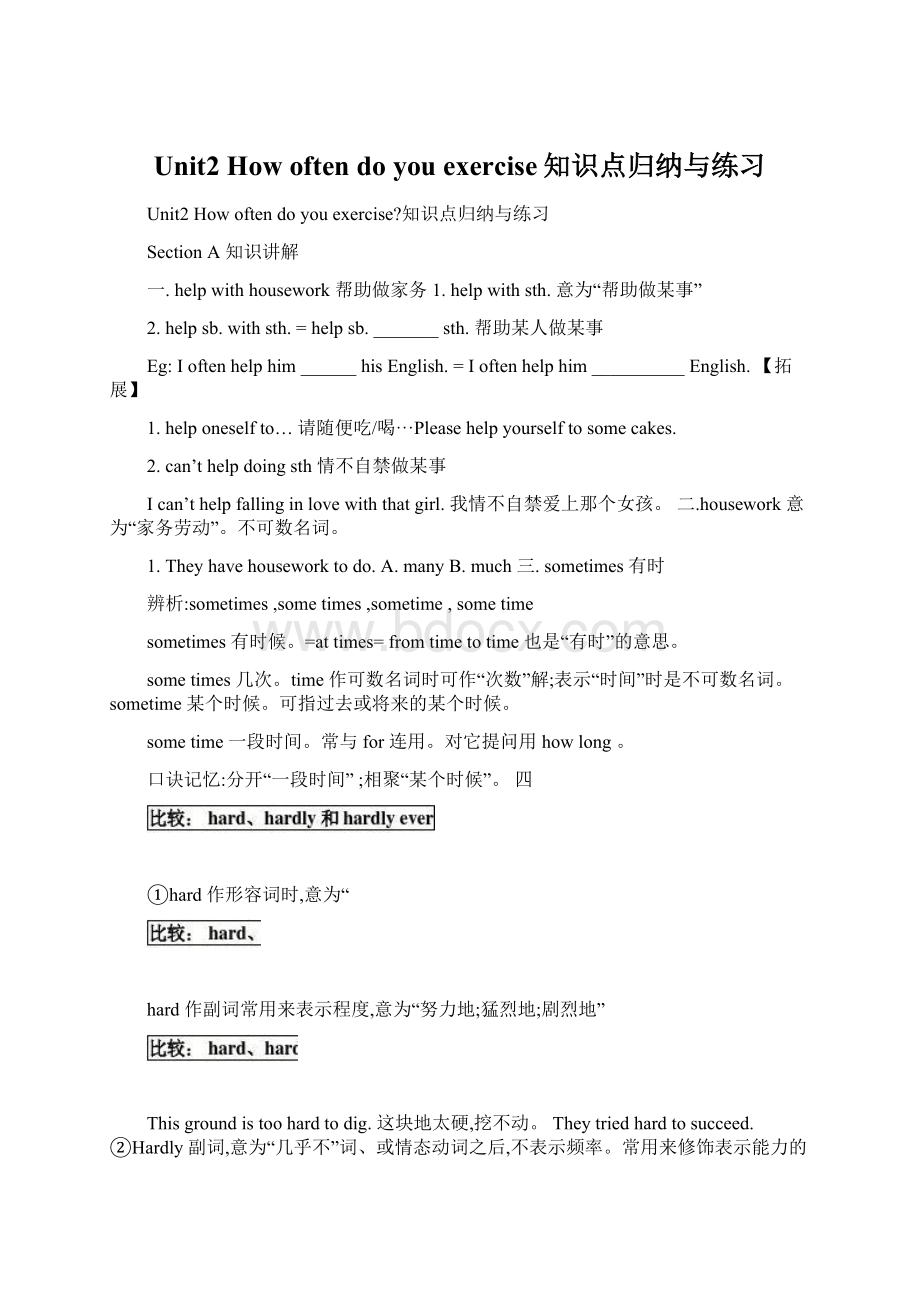Unit2 How often do you exercise知识点归纳与练习.docx
《Unit2 How often do you exercise知识点归纳与练习.docx》由会员分享,可在线阅读,更多相关《Unit2 How often do you exercise知识点归纳与练习.docx(14页珍藏版)》请在冰豆网上搜索。

Unit2Howoftendoyouexercise知识点归纳与练习
Unit2Howoftendoyouexercise?
知识点归纳与练习
SectionA知识讲解
一.helpwithhousework帮助做家务1.helpwithsth.意为“帮助做某事”
2.helpsb.withsth.=helpsb._______sth.帮助某人做某事
Eg:
Ioftenhelphim______hisEnglish.=Ioftenhelphim__________English.【拓展】
1.helponeselfto…请随便吃/喝···Pleasehelpyourselftosomecakes.
2.can’thelpdoingsth情不自禁做某事
Ican’thelpfallinginlovewiththatgirl.我情不自禁爱上那个女孩。
二.housework意为“家务劳动”。
不可数名词。
1.Theyhavehouseworktodo.A.manyB.much三.sometimes有时
辨析:
sometimes,sometimes,sometime,sometime
sometimes有时候。
=attimes=fromtimetotime也是“有时”的意思。
sometimes几次。
time作可数名词时可作“次数”解;表示“时间”时是不可数名词。
sometime某个时候。
可指过去或将来的某个时候。
sometime一段时间。
常与for连用。
对它提问用howlong。
口诀记忆:
分开“一段时间”;相聚“某个时候”。
四
①hard作形容词时,意为“
hard作副词常用来表示程度,意为“努力地;猛烈地;剧烈地”
Thisgroundistoohardtodig.这块地太硬,挖不动。
Theytriedhardtosucceed.②Hardly副词,意为“几乎不”词、或情态动词之后,不表示频率。
常用来修饰表示能力的词,如can,could等。
Hecanhardlyplayfootball.他几乎不会打篮球。
Thereishardlyanycoffeeleft.几乎没有剩余的咖啡了
③hardlyever是频率副词,“几乎不;几乎没有”,相当于almostnot,seldom。
五.exercise
锻炼、运动”。
—Howoftendoyouexercise?
锻炼、运动”,常与动词take连用。
运动使我保持健康。
约翰喜欢在户外锻炼。
练习;操”。
Wedomorning_______everyday.我们每天做早操。
六.usetheInternet用互联网
usesth.todosth.用某物做某事我用刀切面包。
短语:
ontheInternet在网上
七.What’syourfavorite...?
=What...doyoulikebest?
你最喜欢的......是什么?
1.What’syourfavoriteanimal?
你最喜欢的动物是什么?
=___________八.free意为“空闲的,有空的”反义词busy。
befree意为“闲着,有空”eg:
:
Heisfreenow.他现在有空。
拓展:
free还可译为“免费的”Eg:
Theticketsarefree.票是免费的。
九.quitefull很忙,相当忙.
1.adj.full还可译为“满的,充满的”。
反义词是empty,意为“空的”。
Eg:
Thebuswasfullwhentheygotthere.翻译_______________.
拓展:
AbefullofB.=AbefilledwithB;A中充满了B。
Theroomisfullofstudents.Thebusisfullofpeople.
Thehallis_____people.A.fillwithB.fullwithC.filledofD.filledwith
2.fulladj.“饱的”。
其反义词是hungry,意为“饥饿的”。
Areyouhungryorfull?
你饿了还是饱了?
Eg:
Ican’teatanymore,Iamquitefull.我不能再吃了,我相当饱了。
十.maybe“也许,大概,可能”,常位于句首。
Eg:
MaybeheknowsTom.也许他认识Tom。
十一.atleast意为“至少”。
其反义词为atmost“最多”。
Eg:
Thereareatleast1,500studentsinourschool.__________________。
十二.howoften意为“多久一次”,常用于对时间频率的提问。
回答可用
once/twice/threetimesaday(一天一/两/三次,sometimes(有时,never(从不,veryoften(经常等。
十三.look、see、watch和read辨析:
look为不及物动词,后接宾语时须用介词at,指看的动作。
see着重于看的后果,即“看到,看见”。
read多指“看书、报”,这里的“看”实为“读”。
watch表示“注视,观看,监视”之意。
也常用于“看电视,看比赛”等短语中
SectionB
一.wantsb.todosth.的否定形式为wantsb._____todosth.
Eg:
Shewantsmetobringhimsomepens.否定:
Shewantsme___himsomepens.1.wantsth.想要某物2.wanttodosth.想要做某事3.want(sb.todosth.=wouldlike/love(sb.todosth.
二.begoodfor意为“对……有益”。
反义词为bebadfor“对……有害”。
Eg:
Vegetablesaregoodforyou.蔬菜对你有好处。
【拓展】1.begoodto“对…好”,其反义短语为bebadto“对…不好”。
2.begoodat“在…方面擅长”,at后面常接名词、代词或动词-ing形式,同义短语为dowellin。
SheisgoodatEnglishandChinese.=ShedoeswellinEnglishandChinese.她擅长英语和汉语。
Iamgoodat_______(playbasketball.3.begoodwith“和…相处得好;擅于和…相处”。
你和孩子们相处得好吗?
三.1.healthn.“健康(状况”,常用于“beingood(poor/badhealth”短语中,表示“身体好(不好”。
Mygrandparentsarebothingoodhealth.我祖父母身体都很好。
2.healthyadj.健康的unhealthyadj.不健康的四.asksb.aboutsth.“询问某人关于某事”
Eg:
Iaskedmyteacherabouttoday’shomework.五.Herearetheresults.这是(调查结果。
here位于句首,句子要倒装。
Hereis+单数名词。
Hereare+复数名词.
Eg:
Hereisyourjacket.这是你的夹克。
六.find+宾语+名词,发现:
Wehavefoundhim(tobeagoodboy.find+宾语+形容词,发现:
Hefoundtheroomdirty.
七.1.百分数由percent表示,基数词+percent,常用“数词+percentof+名词”
这一结构作主语时,谓语的单复数要看percentof后跟的名词,如果是可数名
词复数,谓语应该用复数,如果是不可数名词,谓语应该用单数Thirtypercentofthestudents______(likewatchinggameshows.
70percentofwater_______(besaltywater(盐水。
八.not...atall“一点儿也不,根本不”,not和be、助动词或情态连用。
Eg:
Idon’tknowaboutitatall.对那件事我一点也不知道。
Thestoryisn’tinterestingatall.Theoldmancan’tusethecomputeratall.拓展:
notatall=youarewelcome意为“不用谢,不客气”。
Eg:
--Thankyouforyourhelp.--Notatall.九.surprised惊奇的,感到意外的
1.besurprisedatsb./sth./doingsth.对…感到惊奇Wearesurprisedatthenews.
2.besurprisedtodosth.对做某事感到惊讶I’mverysurprisedtomeetyouhere.
3.besurprisedthat+从句.因…感到惊讶I’msurprisedthathecamehereontime.【拓展】surprising令人惊讶的toone’ssurprise令某人惊讶的是
insurprise惊讶地;吃惊地
十.theanswerstoquestions问题的答案thewaytosp去某地的路十一.moststudents=mostofthestudents大多数学生
1.most+复数名词.Mostbirdscanfly.大多数鸟儿会飞.________大部分时间
2.mostof+限定词+复数名词mostofthegirls,mostofmyfriends
3.mostof+人称代词宾格mostofthem/us
______thestudentslikereadingthestory.A.MostB.Mostof4.the+most+多音节形容词,表示最高级,意为“最”。
Thisisthemostbeautifulflower.这是最漂亮的花。
如果most前有不定冠词a,则表示“非常;很”,相当于very。
Sheisamostbeautifulgirl.她是个非常漂亮的姑娘。
十二.although“虽然,尽管”。
although与but不能同时使用。
Mycousinknowsalotaboutgeography,althoughheisonlyfouryearsold.十三.It’s+adj+(for/ofsb.+todosth.“(对某人来说做某事是…的”。
Eg:
It’sveryimportanttolistencarefullyinclass.上课认真听讲很重要。
It’seasyforustoswim.对我们来说游泳很容易。
It’sveryniceofyoutohelpmeout._____________
十四.by+交通工具乘….by+时间到…..时(为止by+地点在…..旁边【拓展】through和by的区别、
through后常加名词表示手段媒介,throughexercise通过锻炼
by后常加工具或v-ing,byworkinghard(bydoingsth.通过做某事十五.suchas例如;像…这样。
后面跟名称、代词、动词的ing形式
Eg:
Ihavealotofhobbies,suchas____and_____.我有许多爱好,如读书和唱歌。
拓展:
suchadj.&pron.这样的;那样的;类似的;作形容词时,其后修饰名词。
Tomlivesinsuchalargehouse.汤姆住在一所这么大的房子里。
二者都有“如此;这样”的意思,但具体用法相异。
such用来修饰名词,so用来修饰形容词或副词。
①such+a/an+adj.+n.(单数②such+adj.+n.(复数/不可数名词③so+adj./adv.④so+adj.+a/an+n.(单数=such+a/an+adj.+n.(单数⑤so+many/few/much/little+n.(复数/不可数名词Heissuchacleverboy.=Heissocleveraboy.It'ssuchfineweathertoday.Theydidn'thavesomuchtimetodotheirhomework.他们没有如此多的时间做作业。
十六.spend意为“度过”或“花费(时间、金钱”。
Eg:
Comeandspendtheweekendwithus.来和我们一起度过周末吧。
spendtime\moneyonsth.在...上花费时间或金钱.=spendtime\money(indoingsth.花费时间或金钱做某事Hedidn’tspendmuchtimeonhishomework.=Hedidn’tspendmuchtime____hishw.Ispend200yuanonanewcoat.=Ispend200yuan______anewcoat.Don’tspendtoomuchtimewatchingTV.=Don’tspendtoomuchtime_____TV.Healwaysspendhistimeplayingfootball.=Healwaysspendhistime______football.拓展比较:
1.cost的主语是物sth.costssb.+金钱/时间某物花了某人多少钱/时间。
doingsth.costssb.+时间做某事花了某人多少时间。
2.take后面常跟双宾语,常见用法有以下几种:
Ittakessb.+时间/金钱+todosth.做某事花了某人多少时间。
例:
Ittookthemthreeyearstobuildthisroad.他们用了三年时间修完了这条路。
3.pay的基本用法是:
(1pay(sb.moneyforsth.付钱(给某人买……。
Ihavetopaythem20poundsforthisroomeachmonth.我每月要付20英磅的房租。
(2payforsth.付……的钱。
Ihavetopayforthebooklost.我不得不赔丢失的书款。
(3payforsb.替某人付钱。
Don’tworry!
I'llpayforyou.别担心,我会给你付钱的。
(4paysb.付钱给某人。
Theypayuseverymonth.他们每月给我们报酬。
十七.throughprep.以;凭借;穿过Hebecamerichthroughhardworkandability.他凭借辛苦的工作和能力变得富有。
thewindow.through“穿过”,从物体内穿过。
Theywalkedthroughtheparkaftersupper.across“穿过”,从物体表面通过。
Iswamacrosstheriverandfeltverytired.over“越过;跨过”,越过一个有高度的物体。
Canyoujumpoverthetable?
十八.however“然而,不过”可位于句首句中,句末.但要用逗号隔开。
Eg:
Shewasill.However,shestillwenttowork.她病了,然而她依然去上班。
辨析:
but和however
but直接连接前后两个句子,转折的意味比however强,表示非常明显的对比。
However“然而,但是”。
不能直接连接句子,必须用逗号与句子隔开。
Eg:
1.Itbegantorain,________,wewentouttolookfortheboy.2.Itasunnymorning,______verycold.这是个晴朗的早晨,但是却很冷。
十九.morethan相当于over。
意为“超过,多余”。
Therearemorethan2000books.二十.afraid意为“担心的,害怕的”。
1.beafraidtodosth.害怕做某事Eg:
Iamafraidto_______plane.我害怕乘飞机。
2.beafraidofsb.\sth.害怕某人\某物
beafraidofdoingsth.害怕做某事Eg:
Sheisafraidofthedog.她害怕那只狗。
Don’tbeafraid________questions.不要怕问问题。
二十一.lessthansix.少于6小时。
lessthan意为“不到,少于”。
其反义词为morethan/over“多余,超过”Eg:
Shesleepslessthansevenhourseverynight.他每晚的睡眠时间不到7小时。
WeknowTomfor________20years.我们认识Tom超过20年了。
拓展:
less是little的比较级,Shehaslessmilkthanme.22.diev.消失;消灭;死亡1.“死亡”,不用于被动语态,强调动作,瞬间动词,不能与一段时间连用。
Hisgrandfatherdiedfiveyearsago.他祖父五年前去世的。
2.die可以用于进行时态,dying,表示“即将死去,奄奄一息”。
Heisdying.他快要死了。
拓展:
1.dead死的,是die的形容词形式。
可作表语或定语。
作表语时,表示状态。
Hisdoghasbeendeadfortwoweeks.他的狗已死了两周了。
2.death死亡,是die的名词形式。
Hismother'sdeathmadehimverysad.他母亲的去世使他非常难过。
23.nonenone与noone,nobody
1.noone=nobody,两者均
Noone[Nobody]______谁也不知道。
Noone[Nobody]_______it.没人喜欢它。
注:
按传统语法,两者之后均不能接of短语。
2.none
语只能用单数,若指可数名词,则谓语可用单数或复数。
A:
HowmanyEnglishbookshaveyouread?
你读过多少本英文书?
B:
None.一本也没读。
A:
Howmuchmoneydidyougiveher?
你给了她多少钱?
B:
None.一分也没给。
A:
Whowenttoseethefilm?
谁去看电影了?
B:
Noone[Nobody].谁也没去。
24.mind
1.mindn.“思想”、“想法”、“头脑”、“智力”。
changeone’smind(改变主意,makeupone’smind(下定决心,setone’smindto(do(专注于……,keepinmind(记在心里,comeintoone’smind(计上心来等。
2.mindv.“介意”、“反对”,常用来表示委婉、客气的请求。
“Would/Doyouminddoing...意为“……你介意吗?
Wouldyoumindclosingthedoor?
关上门好吗?
3.Nevermind意为“没关系”、“不要紧”
25.point1.n.分数,得分
Shealwaysgetsgoodpointsinanysubject.不管哪一学科,她总是得高分。
n.要点,论点v.用手指...pointto(指向...强调方向pointat(指着...
Hepointedtothedoor.Sheispointingatthemathquestionontheblackboard.
单元试题
一、选择填空
(1.—Howoftendoyoutakeexercise?
—______.
A.sometimes
B.Threehours
C.Atthreeo'clock
D.Intwohours
(2.Theywereverytired._______,theydecidedtokeepgoing.
A.So
B.However
C.Because
D.Although
(3、—______doesyourmothergoforawalk?
—Everyafternoon.
A.Howlong
B.Howoften
C.Howmuch
D.Howmany
(4.—Wouldyoulikesomebread?
—______,I'mfull.
A.No,thanks.
B.Yes,please.
C.No,Idon'tlikeit.
D.Yes,Iwould.
(5.Youarenothealthyatall.Youneedtoeat______fastfoodandexercise______.
A.more,less
B.less,le